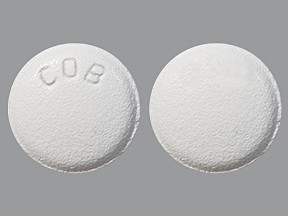COBIMETINIB - ORAL
PHONETIC PRONUNCIATION: (KOE-bi-ME-ti-nib)
COMMON BRAND NAME(S): Cotellic
GENERIC NAME(S): cobimetinib fumarate
Uses
USES: Cobimetinib is used with another medication (vemurafenib) to treat a type of skin cancer (melanoma). It works by slowing or stopping the growth of cancer cells.
How to use COBIMETINIB - ORAL
HOW TO USE: Read the Patient Information Leaflet if available from your pharmacist before you start taking cobimetinib and each time you get a refill. If you have any questions, ask your doctor or pharmacist. Take this medication by mouth with or without food as directed by your doctor, usually once daily for 21 days, then stopping the medication for 7 days. This is one cycle of treatment. Continue taking the medication this way as directed by your doctor. If you vomit after taking a dose, do not take another dose at that time. Take your next dose at the regular time. The dosage is based on your medical condition, response to treatment, and other medications you may be taking. Be sure to tell your doctor and pharmacist about all the products you use (including prescription drugs, nonprescription drugs, and herbal products). Take this medication regularly to get the most benefit from it. To help you remember, take it at the same time each day. Do not increase your dose or use this drug more often or for longer than prescribed. Your condition will not improve any faster, and your risk of side effects will increase. Since this drug can be absorbed through the skin and lungs and may harm an unborn baby, women who are pregnant or who may become pregnant should not handle this medication or breathe the dust from the tablets.
Side Effects
Precautions
Interactions
Overdose
Images
Reviews
Faq for COBIMETINIB - ORAL
Cobimetinib is an oral medication used for the treatment of advanced melanoma that cannot be surgically removed or has spread to other parts of the body.
Cobimetinib inhibits the activity of a specific protein called MEK, which is involved in cell growth and division. By blocking MEK, Cobimetinib helps to slow down or stop the growth of cancer cells.
Cobimetinib is usually taken once daily, with or without food. The dosage will depend on the patient's individual requirements and the prescribing doctor's instructions.
The most common side effects of Cobimetinib include diarrhea, nausea, vomiting, fatigue, rash, photosensitivity, joint pain, headache, and fever. It is important to inform your doctor about any severe or persistent side effects.
Yes, Cobimetinib is often used in combination with another medication called vemurafenib for the treatment of melanoma that has a specific mutation called BRAF V600E or V600K. However, the use of Cobimetinib with other medications should be determined by a healthcare professional.
Cobimetinib may interact with other medications, so it is important to inform your doctor about all the medications, supplements, and herbal products you are taking. Medications that may interact with Cobimetinib include certain antibiotics, antifungals, antidepressants, and heart medications.
Cobimetinib may not be suitable for everyone. It is important to discuss your medical history and current medications with your doctor before starting Cobimetinib. Pregnant or breastfeeding women should also avoid Cobimetinib, as it may harm the unborn baby or pass into breast milk.
The duration of Cobimetinib treatment will depend on various factors, including the stage of melanoma and the response to treatment. Your doctor will determine the appropriate treatment duration for you.
Cobimetinib can cause severe or potentially fatal side effects, such as bleeding, heart problems, or liver problems. It is important to inform your doctor immediately if you experience any unusual symptoms or side effects while taking Cobimetinib.
Disclaimer
IMPORTANT: HOW TO USE THIS INFORMATION: This is a summary and does NOT have all possible information about this product. This information does not assure that this product is safe, effective, or appropriate for you. This information is not individual medical advice and does not substitute for the advice of your health care professional. Always ask your health care professional for complete information about this product and your specific health needs.

No Reviews Yet